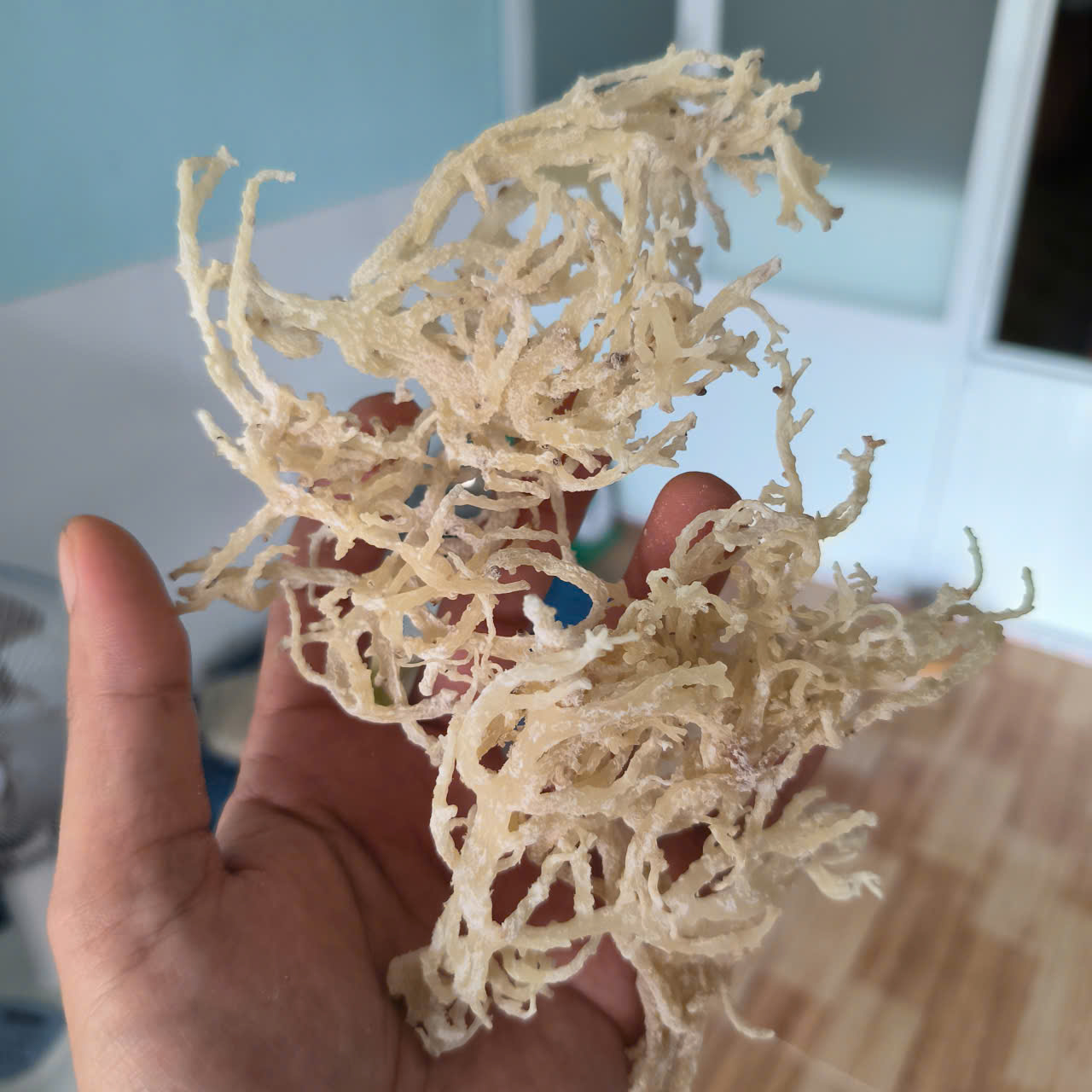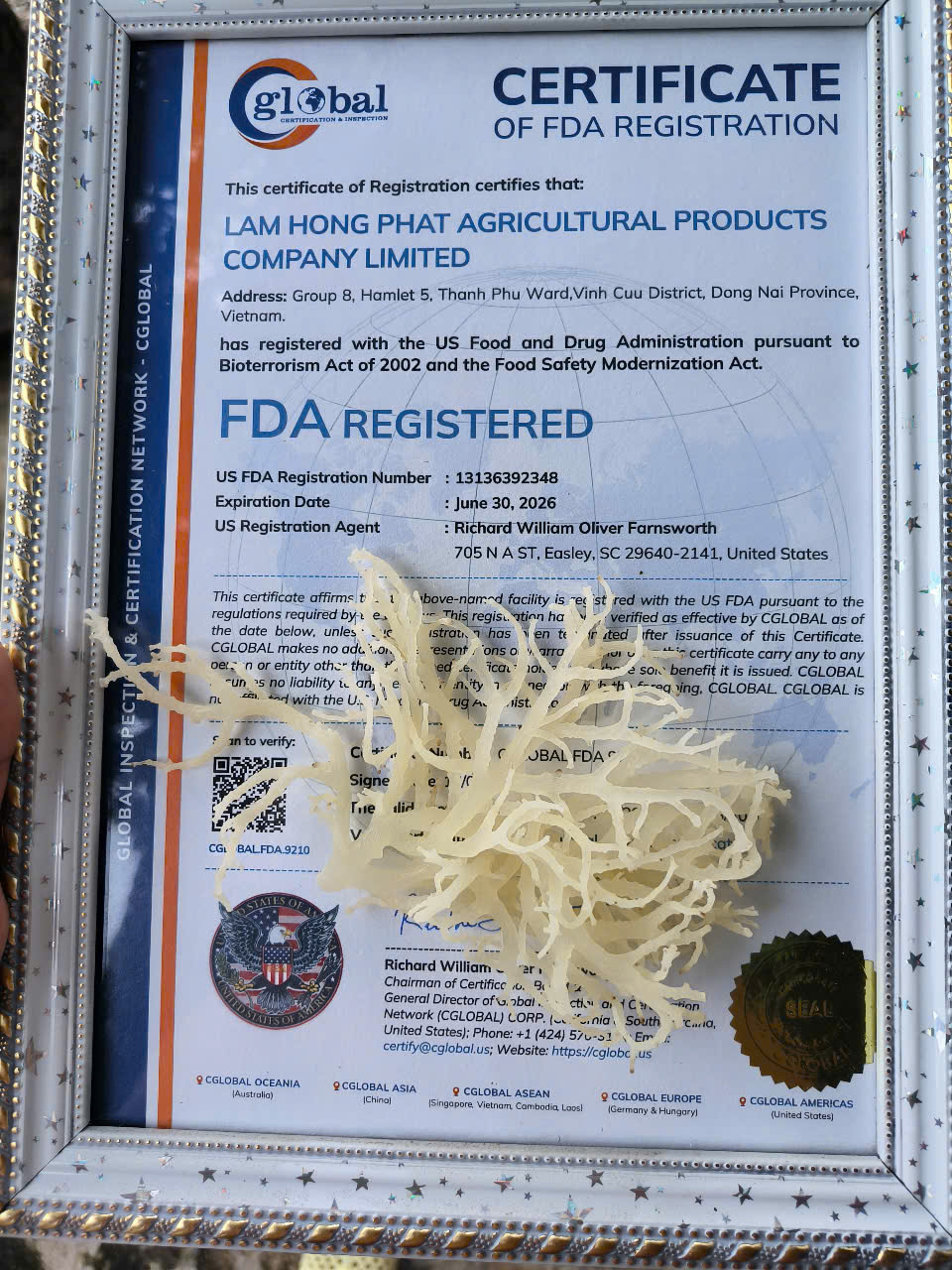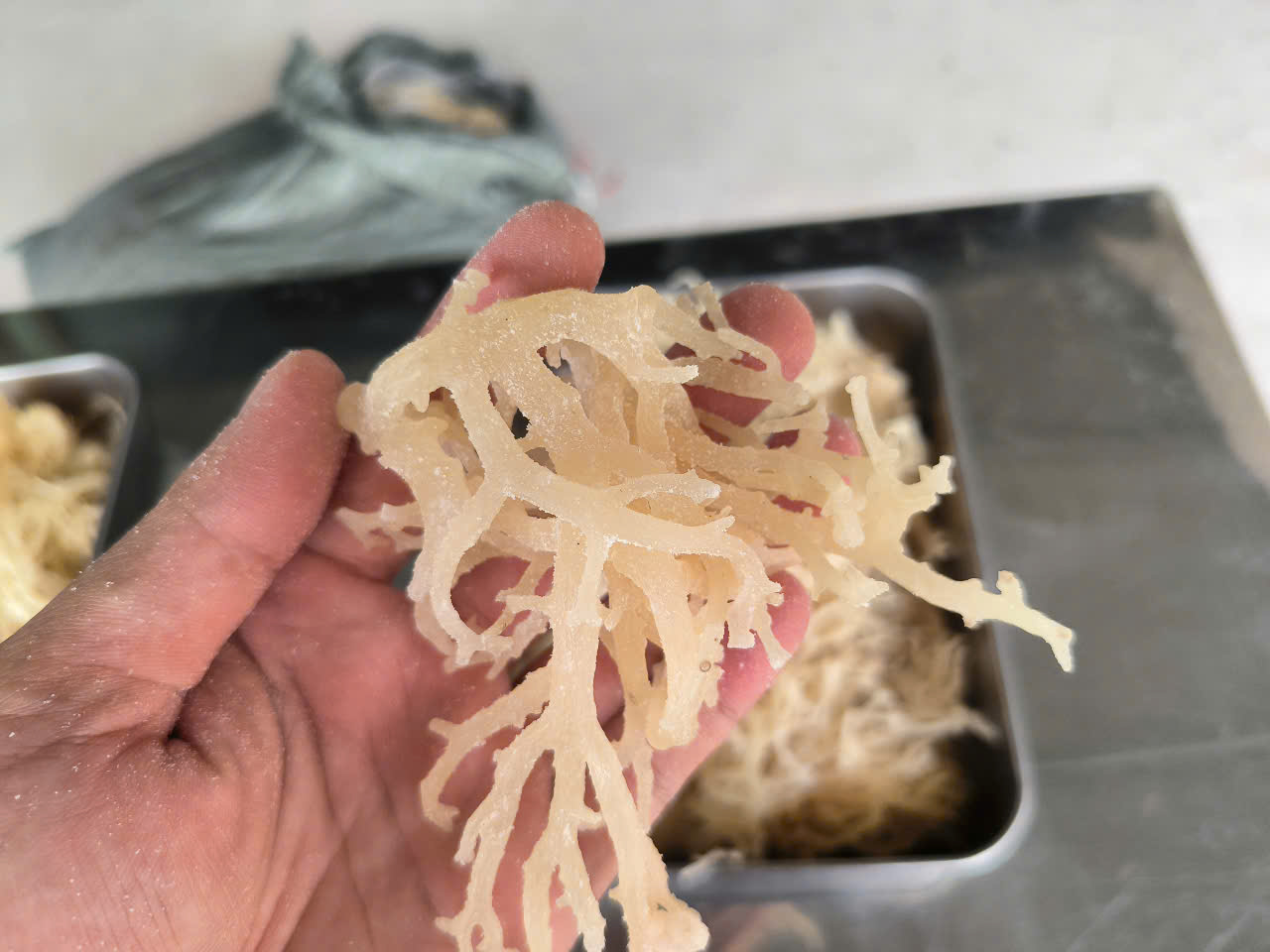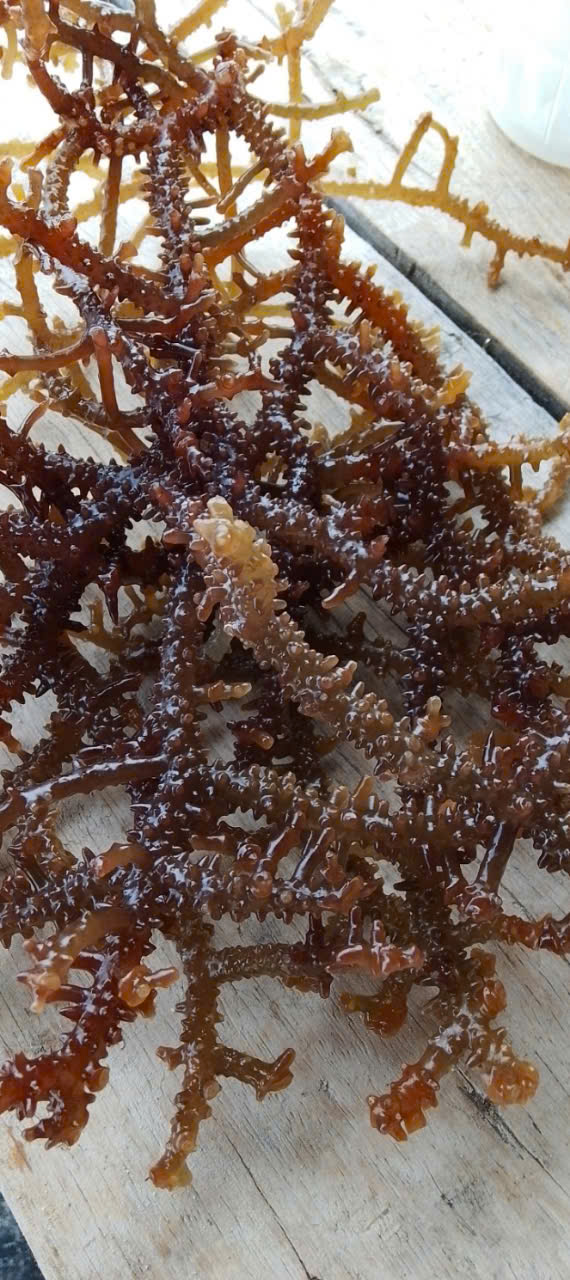Carrageenan for lotion thickening has become a notable ingredient for many businesses in the cosmetics industry. What are the key aspects of carrageenan in cosmetic production, and what specific benefits does it offer? Let us explore these topics below.
1. Sustainability of carrageenan compared to other thickeners on the market
As the global cosmetics industry shifts towards sustainable ingredients, carrageenan for lotion thickening has emerged as an outstanding choice. Carrageenan is an organic hydrocolloid for cosmetics extracted from sea moss (Kappaphycus Alvarezii) – a rapidly renewable resource that does not place pressure on land or freshwater sources. Seaweed cultivation requires no chemical fertilizers or pesticides, while also contributing to CO₂ absorption and reducing ocean acidification, making the cosmetics supply chain more environmentally friendly.
In contrast, many traditional lotion thickeners such as carbomer or PEGs are petrochemical-derived. The production of these materials not only consumes significant energy but also poses risks of water and soil pollution. Other hydrocolloids, such as gelatin, are sourced from animals, making them unsuitable for vegan-friendly products and raising ethical concerns regarding production.
In terms of biodegradability, carrageenan surpasses synthetic thickeners. When released into the environment, carrageenan can naturally decompose without leaving behind microplastics or toxic residues. This is a major advantage as cosmetic brands face increasing pressure to comply with stringent environmental regulations.
The combination of thickening efficiency, safety, and sustainability has positioned carrageenan as an ideal natural gelling agent for skincare for brands pursuing “green beauty” or “clean label” certifications.

Lam Hong sea moss rich in carrageenan for lotion thickening
2. Applications of carrageenan in lotion and comparison with other raw materials
The most notable application of carrageenan for lotion thickening is its ability to create a smooth, moderately viscous, and stable texture over time. Thanks to its gelling properties, carrageenan helps oil, water, and active skincare ingredients blend more effectively, delivering a pleasant sensation when applied to the skin. This makes carrageenan an organic hydrocolloid for cosmetics widely favored in lotions, body creams, and moisturizers.
Compared to xanthan gum – another widely used hydrocolloid – carrageenan produces a smoother texture without stickiness and has minimal impact on the product’s color or fragrance. While xanthan gum is suitable for high-viscosity products, carrageenan offers greater flexibility in adjusting thickness, allowing lotions to maintain a lightweight feel upon application.
When compared with animal-derived gelatin, carrageenan is not only vegan but also more stable across a wider pH range, making it suitable for formulations containing botanical extracts or mild acids. Additionally, unlike synthetic polymers, carrageenan does not require complex chemical processing, helping shorten production timelines and reduce emissions.

Certification of Lam Hong sea moss components
Another major advantage is that carrageenan’s compatibility with other hydrocolloids for cosmetics such as guar gum or locust bean gum, enabling manufacturers to fine-tune formulas to achieve the desired viscosity, stability, and skill feel.
Comparison table: Carrageenan vs. common lotion thickeners
|
Criteria |
Carrageenan (Seaweed, Vegan) |
Xanthan Gum (Microbial) |
Gelatin (Animal-Derived) |
Carbomer/PEGs (Petrochemical) |
|
Origin |
Seaweed (vegan) |
Microorganisms |
Animal |
Petrochemical |
|
Sustainability |
High, rapidly renewable |
Medium |
Low (animal source) |
Low |
|
Biodegradability |
Yes |
Yes |
Yes |
Not fully |
|
Skin feel |
Smooth, lightweight |
Slightly sticky, viscous |
Smooth, slightly heavy |
Smooth |
|
pH stability |
Wide (4–9) |
Wide |
Narrow |
Wide |
|
Cost |
Competitive |
Competitive |
High |
Medium–High |
Currently, carrageenan is abundant in sea moss. Businesses may consider selecting sea moss as a raw material input, particularly when alternative sources of carrageenan are more expensive.

Lam Hong sea moss ready to meet export demands
3. Carrageenan and its outstanding benefits for the organic cosmetics industry
With the growing consumer preference for safe products with transparent origins, carrageenan for lotion thickening is regarded as an ingredient that satisfies both manufacturers and end users. Carrageenan contains no petrochemical derivatives, is non-GMO, and meets the standards of an organic hydrocolloid for cosmetics, enabling products to easily achieve internationally recognized organic certifications such as COSMOS or USDA Organic.
One of carrageenan’s most notable advantages is its ability to form a natural moisture-retaining film on the skin. This film does not clog pores, while effectively locks in hydration and keeping the skin soft for hours. This is particularly valuable for lotions intended for dry climates or air-conditioned environments.
Carrageenan is also a natural gelling agent for skincare that is highly compatible with a variety of natural ingredients such as argan oil, shea butter, and aloe vera extract, enhancing both moisturizing and skin-repairing effects. Compared to synthetic thickeners, carrageenan is less likely to cause irritation, making it suitable even for sensitive skin.
Furthermore, using carrageenan adds strategic value in marketing. Brands can highlight its biodegradable and vegan qualities in communication campaigns, thereby appealing to premium, eco-conscious consumer segments.

Lam Hong sea moss committed to certified organic farming
4. Formula compatibility and flexibility in production
One of the key strengths of carrageenan for lotion thickening lies in its high compatibility with a wide range of cosmetic formulations. Whether a lotion contains brightening agents, anti-aging ingredients, or UV protection, carrageenan maintains stable viscosity without altering the product’s color or fragrance.
Compared to other hydrocolloids for cosmetics, carrageenan stands out for its excellent interaction with salts and proteins, forming a uniform gel structure. This is particularly advantageous in lotion formulations containing milk extracts, collagen, or peptides.
From a production perspective, carrageenan disperses easily in warm water and performs well within a pH range of 4–9, helping to save both time and energy. This is a clear advantage over certain hydrocolloids that require a narrow pH range or high heat, which can limit ingredient choices.
Moreover, carrageenan can be blended with other natural gelling agents for skincare options to create unique sensory textures, from lightweight, milk-like lotions to rich, deeply nourishing creams. This flexibility enables manufacturers to diversify product lines without overhauling the entire production process.
For these reasons, carrageenan is not only a thickening solution but also a “creative tool” for brands aiming to optimize product performance and quality.
5. Economic benefits and market trends
In the global cosmetics market, demand for organic hydrocolloid for cosmetics is rapidly increasing, particularly in Europe and North America, regions where ingredient regulations are becoming increasingly stringent. Carrageenan for lotion thickening perfectly meets both technical requirements and environmental standards, enabling manufacturers to expand their market reach with ease.
From a cost perspective, carrageenan is more competitive than many other premium hydrocolloids. Since it is derived from sea moss (Kappaphycus Alvarezii), abundantly cultivated in tropical countries such as Vietnam, the Philippines, and Indonesia, both raw material and transportation costs are optimized. This allows brands to maintain reasonable pricing while ensuring high product quality.
From a marketing standpoint, incorporating carrageenan delivers long-term brand value. Messaging such as “vegan,” “biodegradable,” and natural gelling agent for skincare strongly resonates with younger, eco-conscious consumers.
Looking ahead, under the combined pressure of the clean beauty movement and stricter regulations limiting synthetic additives, carrageenan is expected to remain a favored strategic ingredient, enhancing user experience while reinforcing a sustainable brand image.
If you are considering using sea moss with high carrageenan for lotion thickening to your current raw materials, consider contacting Lam Hong se moss to expand your sourcing options.






